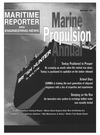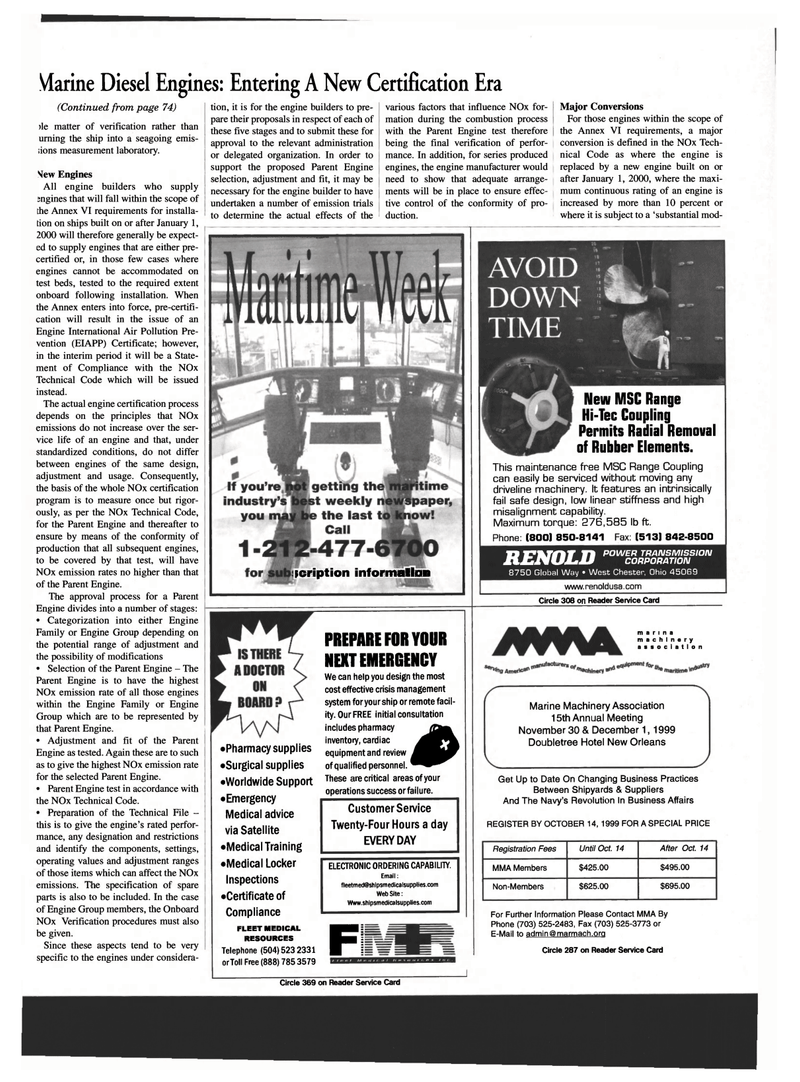
Page 93: of Maritime Reporter Magazine (September 1999)
Read this page in Pdf, Flash or Html5 edition of September 1999 Maritime Reporter Magazine
Marine Diesel Engines: Entering A New Certification Era 0Continued from page 74) )le matter of verification rather than urning the ship into a seagoing emis- ;ions measurement laboratory.
Vew Engines
All engine builders who supply engines that will fall within the scope of the Annex VI requirements for installa- tion on ships built on or after January 1, 2000 will therefore generally be expect- ed to supply engines that are either pre- certified or, in those few cases where engines cannot be accommodated on test beds, tested to the required extent onboard following installation. When the Annex enters into force, pre-certifi- cation will result in the issue of an
Engine International Air Pollution Pre- vention (EIAPP) Certificate; however, in the interim period it will be a State- ment of Compliance with the NOx
Technical Code which will be issued instead.
The actual engine certification process depends on the principles that NOx emissions do not increase over the ser- vice life of an engine and that, under standardized conditions, do not differ between engines of the same design, adjustment and usage. Consequently, the basis of the whole NOx certification program is to measure once but rigor- ously, as per the NOx Technical Code, for the Parent Engine and thereafter to ensure by means of the conformity of production that all subsequent engines, to be covered by that test, will have
NOx emission rates no higher than that of the Parent Engine.
The approval process for a Parent
Engine divides into a number of stages: • Categorization into either Engine
Family or Engine Group depending on the potential range of adjustment and the possibility of modifications • Selection of the Parent Engine - The
Parent Engine is to have the highest
NOx emission rate of all those engines within the Engine Family or Engine
Group which are to be represented by that Parent Engine. • Adjustment and fit of the Parent
Engine as tested. Again these are to such as to give the highest NOx emission rate for the selected Parent Engine. • Parent Engine test in accordance with the NOx Technical Code. • Preparation of the Technical File - this is to give the engine's rated perfor- mance, any designation and restrictions and identify the components, settings, operating values and adjustment ranges of those items which can affect the NOx emissions. The specification of spare parts is also to be included. In the case of Engine Group members, the Onboard
NOx Verification procedures must also be given.
Since these aspects tend to be very specific to the engines under considera- tion, it is for the engine builders to pre- pare their proposals in respect of each of these five stages and to submit these for approval to the relevant administration or delegated organization. In order to support the proposed Parent Engine selection, adjustment and fit, it may be necessary for the engine builder to have undertaken a number of emission trials to determine the actual effects of the various factors that influence NOx for- mation during the combustion process with the Parent Engine test therefore being the final verification of perfor- mance. In addition, for series produced engines, the engine manufacturer would need to show that adequate arrange- ments will be in place to ensure effec- tive control of the conformity of pro- duction.
Major Conversions
For those engines within the scope of the Annex VI requirements, a major conversion is defined in the NOx Tech- nical Code as where the engine is replaced by a new engine built on or after January 1, 2000, where the maxi- mum continuous rating of an engine is increased by more than 10 percent or where it is subject to a 'substantial mod- scription information
PREPARE FOR YOUR
NEXT EMERGENCY •Pharmacy supplies •Surgical supplies •Worldwide Support •Emergency
Medical advice via Satellite •Medical Training •Medical Locker
Inspections •Certificate of
Compliance
FLEET MEDICAL
RESOURCES
Telephone (504)523 2331 orToll Free (888)785 3579
We can help you design the most cost effective crisis management system for your ship or remote facil- ity. Our FREE initial consultation includes pharmacy inventory, cardiac equipment and review of qualified personnel.
These are critical areas of your operations success or failure.
Customer Service
Twenty-Four Hours a day
EVERYDAY
ELECTRONIC ORDERING CAPABILITY.
Email: [email protected]
Web Site:
Www.shipsmedicalsupplies.com
Fi
MbUlldllull 0
This maintenance free MSC Range Coupling can easily be serviced without moving any driveline machinery. It features an intrinsically fail safe design, low linear stiffness and high misalignment capability.
Maximum torque: 276,585 lb ft.
Phone: 1800) 850-8141 Fax: (513) 842-8500 n miiny n power transmission
ItJOmUl^MJ CORPORATION 8750 Global Way • West Chester, Ohio 45069 www.renoldusa.com
Circle 308 on Reader Service Card marina machinery association
Marine Machinery Association 15th Annual Meeting
November 30 & December 1,1999
Doubletree Hotel New Orleans
Get Up to Date On Changing Business Practices
Between Shipyards & Suppliers
And The Navy's Revolution In Business Affairs
REGISTER BY OCTOBER 14, 1999 FOR A SPECIAL PRICE
Registration Fees Until Oct. 14 After Oct. 14
MMA Members $425.00 $495.00
Non-Members $625.00 $695.00
For Further Information Please Contact MMA By
Phone (703) 525-2483, Fax (703) 525-3773 or
E-Mail to [email protected]
Circle 287 on Reader Service Card l\lew MSC Range
Hi-Tec Coupling
Permits Radial Remoual of Rubber Elements.
Circle 369 on Reader Service Card

 92
92

 94
94
